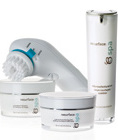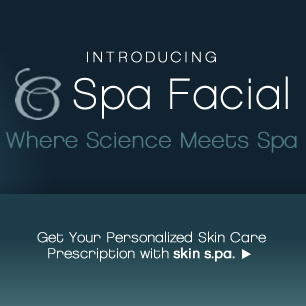The Difference Between Common Skin Ailments
A common question I’ve been getting is how to tell the difference between skin ailments. There are a few that can be mistaken for one another. Being misdiagnosed is very frustrating and can lead to months, or even years of inaccurate treatment, sometimes causing bigger problems than the original ailment.
Keratosis Pilaris (KP) is probably one of the most misdiagnosed skin ailments. It’s very common, and is usually easy to figure out if you’ve had any experience with it. The most common form is usually referred to as “chicken skin” because of the raised bumps that form on the arms, legs or face. The most common misdiagnosis for KP is acne. KP forms whiteheads that look similar to acne on the face or body, but the whiteheads aren’t soft like acne. KP whiteheads are usually harder and tougher, unless they become infected which is quite common if you don’t treat it. Another tell-tale sign is that KP is not usually oily like you might see with acne. Another way to tell the difference is that you can sometimes pop the whitehead off a KP bump (because it’s caused by keratin build-up and not bacteria like acne). Treating KP with acne products can cause KP to turn red and dry, resembling Rosacea.
referred to as “chicken skin” because of the raised bumps that form on the arms, legs or face. The most common misdiagnosis for KP is acne. KP forms whiteheads that look similar to acne on the face or body, but the whiteheads aren’t soft like acne. KP whiteheads are usually harder and tougher, unless they become infected which is quite common if you don’t treat it. Another tell-tale sign is that KP is not usually oily like you might see with acne. Another way to tell the difference is that you can sometimes pop the whitehead off a KP bump (because it’s caused by keratin build-up and not bacteria like acne). Treating KP with acne products can cause KP to turn red and dry, resembling Rosacea.
Since KP can get red, dry and irritated (usually from scratching it), it is commonly misdiagnosed as Rosacea on the face, or eczema on the face or body. The biggest visual difference between KP and Rosacea or Eczema is that KP will normally have the raised “pimples” whereas the other 2 usually don’t, it usually doesn’t stay red all the time like Rosacea, and it usually doesn’t get flaky like Eczema. Eczema and Rosacea treatments will typically not make KP worse, but will definitely not help either. KP will usually start to improve in a few days with deep exfoliation, whereas the other 2 could possibly get much worse. For more information on Keratosis Pilaris and treatment options, see my post titled “Keratosis Pilaris, and the boy who had chicken skin”.
Rosacea often goes undiagnosed, or even worse, misdiagnosed as acne because it sometimes has pimples prese nt. The main difference is that Rosacea is usually very dry, whereas typical acne is usually oily (when not being treated). Since acne products are made to dry up excess oil, this could be very detrimental to someone who has rosacea. It could possibly make the area more red and inflamed, and even drier. A common home treatment for Rosacea is heavy moisturizer, but that could possibly cause acne. A very light daily exfoliation and then moisturizer for sensitive skin will make the area temporarily red, but the long-term benefits are usually worth it. If the redness persists, you might also need something like BC’s Protective Services Calming Fluid to soothe the skin. The exfoliation will get rid of the dead dry skin, and leave the skin smoother and ready to accept the calming fluid and moisturizer. If you use a physical exfoliator, just be careful not to exfoliate too much at one time, it could make the Rosacea worse. You might also want to see a dermatologist to find out if you need a prescription medication.
nt. The main difference is that Rosacea is usually very dry, whereas typical acne is usually oily (when not being treated). Since acne products are made to dry up excess oil, this could be very detrimental to someone who has rosacea. It could possibly make the area more red and inflamed, and even drier. A common home treatment for Rosacea is heavy moisturizer, but that could possibly cause acne. A very light daily exfoliation and then moisturizer for sensitive skin will make the area temporarily red, but the long-term benefits are usually worth it. If the redness persists, you might also need something like BC’s Protective Services Calming Fluid to soothe the skin. The exfoliation will get rid of the dead dry skin, and leave the skin smoother and ready to accept the calming fluid and moisturizer. If you use a physical exfoliator, just be careful not to exfoliate too much at one time, it could make the Rosacea worse. You might also want to see a dermatologist to find out if you need a prescription medication.
Eczema also goes misdiagnosed quite commonly as dry skin, rosacea or fungal infections. S ometimes, eczema is even caused by fungal infections, so it’s hard to separate the treatment for the two. Commonly, the same issues occur for Eczema sufferers as Rosacea. Usually a heavy moisturizer is used, but that can sometimes lead to clogged pores and acne. The same treatment option of light exfoliation and then moisturizer will usually work for Eczema on the face. For Eczema on the body, a body lotion with antioxidants is a great benefit. To treat a possible fungal infection, Tea Tree Oil is fantastic. For more information about Eczema and treatment options see my posts titled “What is Eczema?” and “Treating eczema”.
ometimes, eczema is even caused by fungal infections, so it’s hard to separate the treatment for the two. Commonly, the same issues occur for Eczema sufferers as Rosacea. Usually a heavy moisturizer is used, but that can sometimes lead to clogged pores and acne. The same treatment option of light exfoliation and then moisturizer will usually work for Eczema on the face. For Eczema on the body, a body lotion with antioxidants is a great benefit. To treat a possible fungal infection, Tea Tree Oil is fantastic. For more information about Eczema and treatment options see my posts titled “What is Eczema?” and “Treating eczema”.
To help better understand what you may have, here’s a link to photos of common forms of Rosacea, Eczema and KP, as well as other skin ailments. This will help you better understand the differences, and also help you figure out the right questions to ask if you see a dermatologist. Remember, doctors aren’t perfect, and you have to be your own advocate!






The only tip I have to give is to write about things you’re passionate about. That passion will come across in your writing and you’ll never run out of material.
I actually have all three of these. Keratosis on my arms since I was a child, Eczema on my arms and legs since my teenage years, and Rosacea presented just before I turned 20. My skin hates me.
Hi Rae! Thank you for sharing! I’ve had 2 of the 3, and it’s not fun at all. I can’t imagine having to deal with all 3, especially since somce of the treatments are so different for each. Do you have it under control? Or do you still have flare-ups of all 3?
The Keratosis doesn’t bother me, I hardly even notice it. I haven’t had an eczema flare up for a couple of years now, but a nice cream with steroids for a couple of days usually does the trick (and lots of lotions that contain colloidal oatmeal!). Rosacea bothers me most of all. While I haven’t had much of a flare-up in a little over a year, my skin is still sensitive, scarred, and constantly red due to broken capillaries.
My partner and I stumbled over here by a
different web page and thought I might check things
out. I like what I see so now i am following you. Look forward to exploring your web page yet again.
Hi there to every , for the reason that I
am genuinely keen of reading this web site’s post to be updated daily. It contains fastidious material.
Superb post however I was wondering if you could write a litte more on
this subject? I’d be very grateful if you could elaborate a little bit more. Kudos!
Hi there it’s me, I am also visiting this web site daily, this web page is in fact fastidious and the visitors are genuinely sharing nice thoughts.
Hello colleagues, fastidious paragraph and nice arguments commented at this place, I am in
fact enjoying by these.
I had one KP outbreak but never found the cause. It lasted for a week and a half before I decided to go to the dermatologist. They never figured what it was. Because it was so incredibly itchy (and no amount of Benadryll would relieve it), they gave me a cortisone shot on my behind that made me instantly feel better. I stopped itching, and the bumps started to fade in a few days. I can’t guarantee that would work for you, but it is wor a try. When I was dying of itchyness and embarassment from my KP outbreak that extended from my neck to my feet, I would have tried anything. Hope this helps.
Hi Sandy! Thank you for sharing your experience! As you now know, a Cortisone shot can relieve a short term onset of KP (it can for eczema as well). I also use over-the-counter hydrocortisone topically when I have an extreme case that I just can’t get under control. For those that might be reading this that have chronic KP (or eczema) issues, I want to mention that long term Cortisone shots or hydrocortisone treatments can do more harm than good. It can cause thinning of the skin and cell damage when used long term. Everything in moderation 😉 I’m very glad that the treatment worked and gave you relief!
Hi! This post couldn’t be written any better! Reading this post reminds me of my previous room mate! He always kept talking about this. I will forward this write-up to him. Fairly certain he will have a good read. Thank you for sharing!
Superb blog you have here but I was wanting to know
if you knew of any discussion boards that cover the same topics discussed
here? I’d really like to be a part of group where I can get feedback from other knowledgeable individuals that share the same interest. If you have any suggestions, please let me know. Many thanks!
Very nice article. I definitely appreciate this site.
Continue the good work!
There are certain contrasts between acne rosacea and acne vulgaris. As you probably know, acne vulgaris is the most common form of acne which seems to start with the onset of puberty and is characterized by the formation of whiteheads and blackheads. Acne rosacea, on the other hand, usually makes its first appearance between the ages of 30 and 50, is confined to the face — mostly the nose, cheeks, chin, forehead and eyelids — and is not associated with overactive oil glands.*
My own, personal web blog
<http://www.foodsupplementcenter.com/gluten-free-protein-powder/
Hello, I believe that Rosacea is no longer referred to as “acne rosacea” as it is not a form of acne.
Great piece of writing together with truly beneficial suggestions. Thank you for getting the idea together.
Appreciate this specific helpful article! Make sure you routinely keep it going. Cheers.
Appreciation for the data. Done well!
Cheers. Nice post. Has been trying to find a little while. Longing for far more web logs on your part later on.